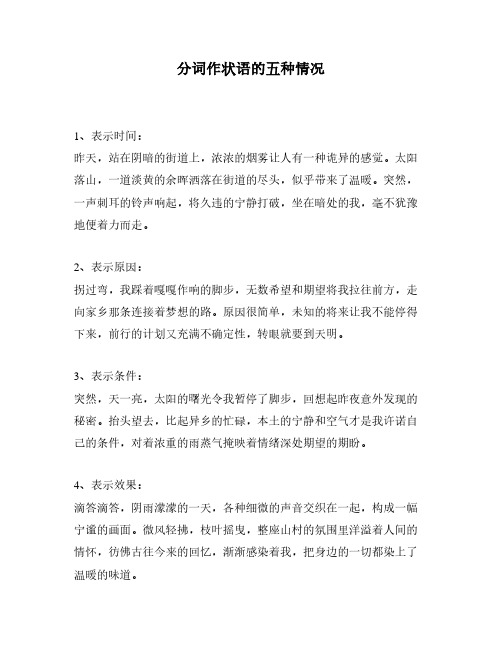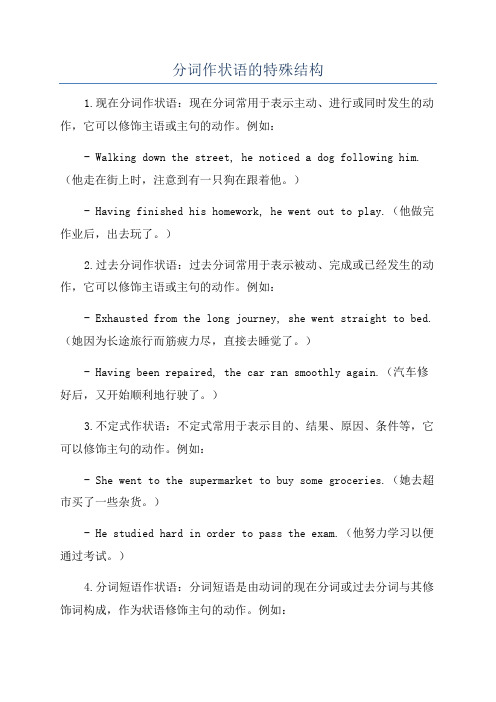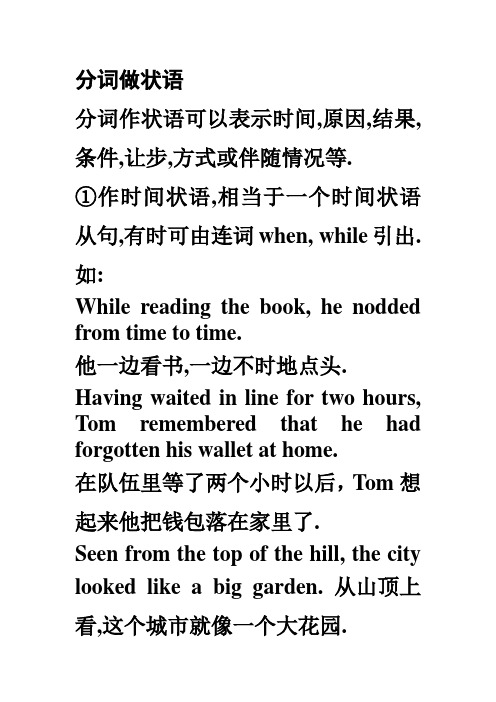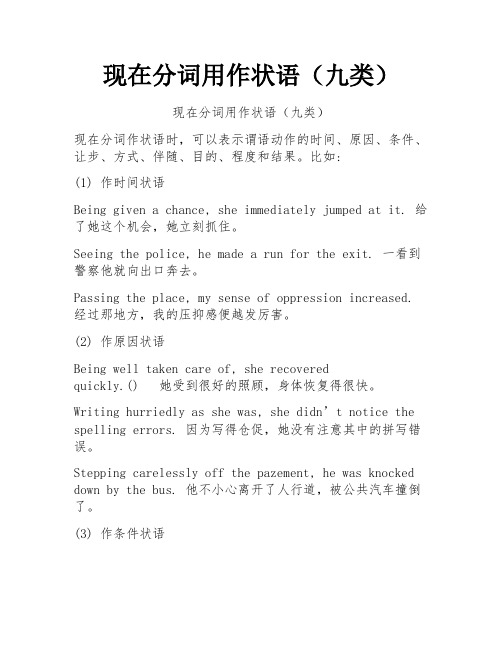分词作状语(1)
分词作状语的五种情况

分词作状语的五种情况
1、表示时间:
昨天,站在阴暗的街道上,浓浓的烟雾让人有一种诡异的感觉。
太阳落山,一道淡黄的余晖洒落在街道的尽头,似乎带来了温暖。
突然,一声刺耳的铃声响起,将久违的宁静打破,坐在暗处的我,毫不犹豫地便着力而走。
2、表示原因:
拐过弯,我踩着嘎嘎作响的脚步,无数希望和期望将我拉往前方,走向家乡那条连接着梦想的路。
原因很简单,未知的将来让我不能停得下来,前行的计划又充满不确定性,转眼就要到天明。
3、表示条件:
突然,天一亮,太阳的曙光令我暂停了脚步,回想起昨夜意外发现的秘密。
抬头望去,比起异乡的忙碌,本土的宁静和空气才是我许诺自己的条件,对着浓重的雨蒸气掩映着情绪深处期望的期盼。
4、表示效果:
滴答滴答,阴雨濛濛的一天,各种细微的声音交织在一起,构成一幅宁谧的画面。
微风轻拂,枝叶摇曳,整座山村的氛围里洋溢着人间的情怀,彷佛古往今来的回忆,渐渐感染着我,把身边的一切都染上了温暖的味道。
5、表示方式:
趁着丝丝晨雾未散的时刻,抽出一伙人携手暗中离去,终于享受到了米饭之间的松软,延续着昔日快乐的痕迹。
把一切都收拾妥当,仿佛穿越时空一样,令一个个熟悉的瞬间再次涌现心中,萦绕着幽暗曾经的眼前。
分词作状语的特殊结构

分词作状语的特殊结构1.现在分词作状语:现在分词常用于表示主动、进行或同时发生的动作,它可以修饰主语或主句的动作。
例如:- Walking down the street, he noticed a dog following him.(他走在街上时,注意到有一只狗在跟着他。
)- Having finished his homework, he went out to play.(他做完作业后,出去玩了。
)2.过去分词作状语:过去分词常用于表示被动、完成或已经发生的动作,它可以修饰主语或主句的动作。
例如:- Exhausted from the long journey, she went straight to bed.(她因为长途旅行而筋疲力尽,直接去睡觉了。
)- Having been repaired, the car ran smoothly again.(汽车修好后,又开始顺利地行驶了。
)3.不定式作状语:不定式常用于表示目的、结果、原因、条件等,它可以修饰主句的动作。
例如:- She went to the supermarket to buy some groceries.(她去超市买了一些杂货。
)- He studied hard in order to pass the exam.(他努力学习以便通过考试。
)4.分词短语作状语:分词短语是由动词的现在分词或过去分词与其修饰词构成,作为状语修饰主句的动作。
例如:- The boy ran into the room, crying loudly.(那个男孩跑进房间,大声哭着。
)- The car skidded on the wet road, causing an accident.(汽车在湿滑的路上打滑,导致了一起事故。
)这些特殊结构的分词作状语可以增加句子的信息量,使句子更加丰富和生动。
分词作状语(1)

1. When ___ why he was so late, he just looked at us and said nothing.a. being askedb. askingc. askedd. to be asked2.A: What were you doing when he came to see you?B: I had just put on my overcoat and _____ to visit a friend of mine.a. leavingb. had leftc. leftd. was leaving3. ______ in Sydney for many years, he knew the city very well.a. Livedb. Livingc. Having livedd. Having living4. The _____ jewels have been found.a. stealb. stealingc. stoled. stolen5. ______ by the Party, he has made much progress.a. Educatedb. Educatingc. Be educatedd. Having educated6.______ news, she couldn’t help but _______ into tears.a. Exciting at the exciting --- burstb. Excited at the excited ---burstc. Exciting at the excited --- burstingd. Excited at the exciting --- bursting7 They want the job ____ by the end of this month.a. to dob. donec. didd. to be doing8.With time _____by, our school will become more and more beautiful.a. to passb. pastc. passedd. passing9.____in the rain, he was wet all over.a. caughtb. catchingc. having caughtd. to be caught10. _______ his exercise book, he was scolded by the teacher.a. Not having handed inb. Having not handed inc. Not handing ind. Handing not in11._____ in such a hurry, his composition has many mistakes.a. Having writtenb. Writingc. As writingd. Having been written 12._____ that some guests were coming, they got the room ready.a. Having toldb. Tellingc. Having been toldd. To tell13._____ from the tower, the city looks just magnificent.a. To seeb. Seeing C. To be seen D. Seen14._____, we have to look after him.a. Tom falls illb. Tom falling illc. For Tom falls illd. Tom’s falling ill 15.Her glass ___, she couldn’t see the words on the blackboard.a. was brokenb. having been brokenc. brokend. breaking16. _______no bus, we had to walk home.a. There beingb. There wasc. There isd. There been17. Weather ____, the meeting will be held tomorrow.a. permitsb. permittingc. permittedd. will permit18.Once ___ alone, the girl started crying again.a. leavingb. leftc. being leftd. having been left19.. All things ____, your plan is practical.a. consideringb. being consideredc. consideredd. are considered20 After________ for the job, you will be required to take a language test.being interviewed b. interviewed c. interviewing d. having interviewed21._________such a good chance, he planned to learn more.a.To be givenb. Having been givenc. Having given D. Giving 22._________with the size of the whol e earth, the highest mountain doesn’t seem high at all.a.When comparedb. Comparec. While comparing D. Comparing 23.The speaker, ________for her splendid speeches, was warmly received by the audience.a. Having knownb. being knowingc. knowingd. known。
过去分词作状语的用法(一)

过去分词作状语的用法(一)过去分词作状语的用法介绍过去分词是英语中的一种非谓语动词形式,可以用作状语来修饰句子的主语或谓语。
它可以表示时间、原因、条件、方式、结果等不同的意义。
本文将详细介绍过去分词作状语的常见用法。
用法一:表示时间过去分词作状语时,可以表示动作发生的时间,常用于时间状语从句中。
•例子1:Having finished her homework, she went to bed early. (完成作业后,她早早就去睡觉了。
)•例子2:Being exhausted, he decided to take a break. (感到精疲力尽,他决定休息一下。
)用法二:表示原因过去分词可以表示动作的原因,常用于表示原因的状语从句中。
•例子1:Disappointed by the results, he decided to give up. (对结果感到失望,他决定放弃。
)•例子2:Feeling sick, she stayed home instead of going to work. (感到不舒服,她待在家里而不去上班。
)用法三:表示条件过去分词可以表示动作发生的条件,常用于条件状语从句中。
•例子1:Given enough time, I can finish the task. (如果给我足够的时间,我可以完成这个任务。
)•例子2:With proper training, he could become a great athlete. (经过适当的训练,他可以成为一名优秀的运动员。
)用法四:表示方式过去分词可以表示动作发生的方式,常用于方式状语从句中。
•例子1:He won the race, running as fast as he could.(他尽可能快地跑,赢得了比赛。
)•例子2:She spoke politely, not wanting to offend anyone.(她礼貌地说话,不想冒犯任何人。
分词做状语

分词做状语分词作状语可以表示时间,原因,结果,条件,让步,方式或伴随情况等.①作时间状语,相当于一个时间状语从句,有时可由连词when, while引出.如:While reading the book, he nodded from time to time.他一边看书,一边不时地点头. Having waited in line for two hours, Tom remembered that he had forgotten his wallet at home.在队伍里等了两个小时以后,Tom想起来他把钱包落在家里了.Seen from the top of the hill, the city looked like a big garden. 从山顶上看,这个城市就像一个大花园.②作原因状语,相当于一个原因状语从句.如:Not knowing his address, I can't send this book to him.因为不知道他的地址,我不能把这本书送给他..Encouraged by the speech, the young people made up their minds to take up the struggle.受到了讲演的鼓舞,年轻人决定起来从事斗争.③表条件,相当于一个条件状语从句,有时过去分词前可用if等词.如: Given another chance, he will do better.再给他一次机会,他会做得更好.If heated, water can be turned intosteam. 水如果被加热,会变成水蒸气.④作方式或者伴随状语,可以放在句子的前面,后面或中间,表示主语的另一个,较次要的动作.如:Following the old man, the young people started walking slowly.年轻人跟在老人的后面开始慢慢地走起来.The old man went into the room, supported by his wife.那个老人在他的妻子的搀扶下走进了房间.⑤表让步,相当于一个though/although引导的让步状语从句.如:Exhausted by the running, they went on running after the robber.尽管已经跑得筋疲力尽,他们还是继续追赶着那个强盗.Laughed at by many people, he continued his study. 尽管被许多人嘲笑,他还是继续他的研究.。
分词作状语

分词作状语在语法中,状语是一种修饰动词、形容词、副词或全句的词组或从句。
状语可以提供关于时间、地点、方式、原因、条件等方面的信息,以帮助读者更好地理解句子的意思。
在中文中,分词可以作为状语出现,以更准确地表达句子的含义和语气。
分词作时间状语分词作时间状语时,可以表示动作的时间、先后顺序、频率等。
常见的分词作时间状语的结构有“分词+时间状语”。
例句:1.昨天下雨,我带着雨伞走到学校。
2.听着音乐,我写完了这篇文章。
在上述例句中,分词作时间状语“听着音乐”和“带着雨伞”分别表示动作发生的时间和做某事的状态。
分词作地点状语分词作地点状语时,可以表示动作发生的地点或者动作的范围。
常见的分词作地点状语的结构有“分词+地点状语”。
例句:1.在花园里散步的时候,我发现了一只漂亮的蝴蝶。
2.躺在床上看书,我感到异常放松。
在上述例句中,分词作地点状语“在花园里散步的时候”和“躺在床上”分别表示动作发生的地点或者动作的范围。
分词作方式状语分词作方式状语时,可以表示动作的方式、方法等。
常见的分词作方式状语的结构有“分词+方式状语”。
例句:1.他用力地关上了门。
2.小明一边跳舞一边唱歌。
在上述例句中,分词作方式状语“用力地关上了门”和“一边跳舞一边唱歌”分别表示动作的方式。
分词作原因状语分词作原因状语时,可以表示动作的原因或动作发生的原因。
常见的分词作原因状语的结构有“分词+原因状语”。
例句:1.太阳下山了,天黑了。
2.因为下雨,所以他没有去散步。
在上述例句中,分词作原因状语“太阳下山了”和“因为下雨”分别表示动作发生的原因。
分词作条件状语分词作条件状语时,可以表示实现某种结果的条件。
常见的分词作条件状语的结构有“分词+条件状语”。
例句:1.如果你不努力学习,你就无法取得好成绩。
2.要是天气好,我们就去郊游。
在上述例句中,分词作条件状语“如果你不努力学习”和“要是天气好”分别表示实现某种结果的条件。
总结通过以上例句的分析,我们可以看出分词作状语能够丰富句子的表达,使得句子更加准确和生动。
现在分词用作状语(九类)

现在分词用作状语(九类)现在分词用作状语(九类)现在分词作状语时,可以表示谓语动作的时间、原因、条件、让步、方式、伴随、目的、程度和结果。
比如:(1) 作时间状语Being given a chance, she immediately jumped at it. 给了她这个机会,她立刻抓住。
Seeing the police, he made a run for the exit. 一看到警察他就向出口奔去。
Passing the place, my sense of oppression increased. 经过那地方,我的压抑感便越发厉害。
(2) 作原因状语Being well taken care of, she recoveredquickly.() 她受到很好的照顾,身体恢复得很快。
Writing hurriedly as she was, she didn’t notice the spelling errors. 因为写得仓促,她没有注意其中的拼写错误。
Stepping carelessly off the pazement, he was knocked down by the bus. 他不小心离开了人行道,被公共汽车撞倒了。
(3) 作条件状语Being advised to talk less, Mary keeps silent while we talk. 要是叫她少说点,当我们说话的时候,玛丽就会保持沉默。
It will take you half an hour to get to the station, allowing for traffic delays. 把路上的耽搁算进去,你要用半小时才能到车站。
Being defeated in every battle, the enemy will soon surrender. 要是敌人每场战斗都被打败,那他们就会投降。
分词作状语

分词作状语现在分词作状语,其实多数情况下是现在分词和它的连带成分一起作状语,即现在分词短语作状语,相当于其相应的状语从句。
多数情况下置于句首,也可置于句末。
例:1.作时间状语Entering the classroom, the students began to read English.一进教室,学生们就开始读英语。
(相当于As soon as/After they entered the classroom)2.作原因状语The girl doesn't feel like eating any food, being ill for a few days.女孩不想吃任何食物,她病了好几天了。
(相当于Because she has been ill for a few days或Because of her being ill for a few days)3.作条件状语Working hard, he will succeed in passing the English examination.努力学习的话,他就可以通过英语考试。
(相当于从句If he works hard)4.作让步状语Being tired after work, he still insists on studying French.下班后很累,他任然坚持学习法语。
(相当于Though he is tired after work或Though tired after work)5.作结果状语People all over the world sing the song, making it popular.全世界的人都唱这首歌,使它流行了起来。
(相当于so that they make it popular)6.作方式状语Travelling by car , we enjoyed many beautifull places.乘车旅行,我们欣赏了很多优美地方。
- 1、下载文档前请自行甄别文档内容的完整性,平台不提供额外的编辑、内容补充、找答案等附加服务。
- 2、"仅部分预览"的文档,不可在线预览部分如存在完整性等问题,可反馈申请退款(可完整预览的文档不适用该条件!)。
- 3、如文档侵犯您的权益,请联系客服反馈,我们会尽快为您处理(人工客服工作时间:9:00-18:30)。
5. You can’t be allowed in unless you keep quiet. 6. Although (he was) doing his homework, he kept on listening to MP3
•
总结三. 从句是__________从句、 从句、 总结三 从句是 从句 __________从句、___________从句。 从句、 从句。 从句 从句
将下列现在分词短语变为状语从句
1. 2. 3. 4. Hurrying up, you can catch up with others. If you hurry up, you can catch up with others. Being ill, he didn’t go to school yesterday. Because he was ill, he didn’t go to school…
Plum incense come from the bitter cold(梅花香自苦寒来)
3. If you work hard, you can be admitted into a good university. (working hard, you can… 4. Though he have visited many places, he hasn’t been abroad. (Though having been to many….
Unit 4 Grammar
Past Participle as adverbial
填入引导时间、原因、 填入引导时间、原因、条件和让步 状语从句的常用连词
状语从句 时间从句 原因从句 条件从句 让步从句 方式从句
引导从句的连词
When, while, before, after Because
If, unless
Although, though As if, as though
指出下列那些句子含有状语从句
1.You must be careful while you are crossing the street. 2. He asked when I had came back. 3. When I was watching TV, I heard someone calling for help. 4. Because he was injured, he didn’t come to school. 5. If you work hard, you can be admitted into a good university. 6. Though he has visited many places, he hasn’t been abroad. 7. Although he was doing his homework, he kept on listening to MP3 8. You can’t be allowed in unless you keep quiet.
5. In spite of being very rich, she felt unhappy. 6. Though having learned English for 5 years, he daren’t talk to foreigners.
•
总结三:分词短语多是表示时间、 总结三:分词短语多是表示时间、_____、 、 _____和_____的短语。 的短语。 和 的短语
指出下列哪些句子有主动语态的状语从句
1. You must be careful while you are crossing the street. 2. When I was watching TV, I heard someone calling for help. 3. If you work hard, you can be admitted into a good university. 4. Though he have been to many places, he hasn’t been abroad. 5. Although he was doing his homework, he kept on listening to MP3 6. Because he was injured, he didn’t come to school. 7. You can’t be allowed in unless you keep quiet.
思考: 思考:
下列被动语态的状语从句能否变为现在分词 短语吗? 短语吗? 1. If it is seen from the top of the TV tower, our city looks more beautiful. 2. Although he had been reminded of the meeting several times, he still forgot it in the end. 下列过去分词短语能否变成状语从句呢? 下列过去分词短语能否变成状语从句呢? 3. Heated, water will changed into steam. 4. When laughed at in public, he is always smiling from ear to ear.
•
总结一: 总结一 分词短语的逻辑主语与大句的主语是 ___________的。 的
3. Hearing the news, he burst into tears. 4. Having finished the job, he left the office.
•
总结二:变成的状语从句语态是 总结二:变成的状语从句语态是______.
将现在分词短语变为状语从句
1. Before going home, we must finish our work. 2. He fell off the tall tree while playing in it. 3. Working hard, you will get a good mark. 努力学习你就能得高分。 努力学习你就能得高分。 4. Not hurrying up, you will be late.如果你不 如果你不 快点,你就会迟到。 快点,你就会迟到。 5. Her mother works very hard although badly ill. 6. Having seen the film, he could talk about it with us.
将主动语态的状语从句变为现在分词短语
1. You must be careful while (you are) crossing the street. 2. When (I was) watching TV, I heard someone calling for help.
•
总结一. 主从句的主语是__________. 总结一 主从句的主语是
练习: 练习: 将状语从句变为现在分词短语
1. He fell asleep while he was reading. 2. As soon as I entered the room, I heard a loud noise. 3. As ( So) long as you keep on trying, you will surely succeed in the end. 4. You can do anything well on condition that you put your heart into it. 5. In spite of the fact that he has made a mistake, he is still a noble man. 6. He came to the meeting despite his illness/ despite the fact that he was ill.
